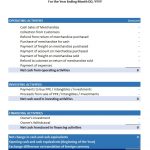
Usually, they will prepare the business’s financial statements for an accountant to review. These include the balance sheet, income statement, and cash flow statement. Some bookkeepers are also assigned payroll duties from checking worker time logs and benefits to cutting cheques and making bank deposits. Bookkeeping skills play an essential role in any business organization by allowing professionals to record accounting transactions and issue important financial statements. A bookkeeper’s work helps to provide company owners and managers with the data to make key decisions that they wouldn’t be able to make without. A bookkeeper is responsible for recording daily financial transactions, updating a general ledger and preparing trial balances how to share information with huffpost for perusal by accountants.
The BLS expects the field to have a 5 percent decline in growth from 2021 to 2031. Still, you should see 197,600 job openings each year over the next decade 3. While bookkeepers can sit for the CB unreimbursed employee expenses what can be deducted exam sections in any order, AIPB recommends taking part one before scheduling part two. To maintain certification, you need to earn at least 60 continuing education credits every three years.
Advanced Proficiency in Accounting Software
I love talking about practical yet creative ways a candidate has worked through past problems. I am a problem-solver myself, so I like to work with people who won’t just come to me with all their problems. I want to see that they thought the issue through and can present a few good solutions for me to consider.
- You may handle payroll functions as a bookkeeper, keep tax withholding records, and issue paychecks or send information to a contracted payroll service.
- A bookkeeper is responsible for recording daily financial transactions, updating a general ledger and preparing trial balances for perusal by accountants.
- The two tests evaluate how well a candidate can manage outstanding invoices, track monies owed by customers, and handle debts owed to suppliers.
- With a certified bookkeeper designation, you are qualified to perform all critical functions through the adjusted trial balance and basic payroll for small to medium-sized businesses.
To become certified, you need to pass a four-part examination, show two years of full-time bookkeeping experience or 3,000 hours of freelance or part-time experience, and sign a code of ethics. Managing the general ledger is part of your daily responsibilities as a bookkeeper. You may determine if any payments are due, submit them, and record them in the financial ledger. As a bookkeeper, you may also receive client payments and deposit them at your company’s financial institution. Generally speaking, people who are good with numbers and record-keeping can be a bit inflexible.
Important Bookkeeping Skills You Need for a Successful Career

A bookkeeper who records numbers perfectly and looks to make sure the data is complete is already great. But a bookkeeper who goes the extra mile to account payable example look for ways to improve is a gem. This kind of pro-active discipline in creating and applying solutions is precious. More than being accurate, bookkeepers need to pay great attention to detail. It’s a completely different thing to take a wider view and notice details. For example, an accurate bookkeeper will record things and not miss one cent.
Organizational Skills
Candidates who excel in time management demonstrate strong organizational skills, an ability to set realistic goals, and discipline to adhere to schedules. Good bookkeepers possess an eye for detail, ensuring that they correctly record every financial transaction. They must use their bookkeeping skills to identify and promptly resolve any discrepancies. Data entry is crucial for bookkeeping tasks, from calculating accounting figures to recording financial data in general ledgers. In the modern digital era, bookkeepers execute most tasks using accounting software and spreadsheets. These tools automate many processes, minimize errors, and provide more detailed financial analysis.
These courses focus on bookkeeping fundamentals to help improve bookkeeping knowledge and skills. For example, you might complete the Intuit Bookkeeping Professional Certificate or several other bookkeeping courses offered by universities and companies on Coursera. Bookkeepers play a vital role in the business accounting cycle by collecting and inputting data. As a detail-oriented professional, you would play a crucial role in the organization and growth of companies from small businesses to major corporations. Bookkeeping can be a great side hustle if you’re good at it and enjoy the work. Once you’ve had some bookkeeping training, you’re ready for real-world bookkeeping jobs or experience.
They will record financial data into general ledgers, which are used to produce the balance sheet and income statement. Your job as a bookkeeper entails systematically keeping track of an organization’s financial transactions. For the information to be reported as a financial statement, it needs to be identified, accepted, classified, and recorded. Learn more about bookkeeping, how it differs from accounting, the required qualifications, and bookkeeping jobs and salaries.
What skills and traits are important for bookkeepers?
Depending on the organization’s size, keeping track of business expenses and reconciling business statements may be your responsibility. A bookkeeper checks for errors when creating reports and managing the general ledger. You will check bank deposits for fraud, fix balance sheet errors, and maintain accurate payroll records. Bookkeepers are important professionals in today’s economic and financial fields.
